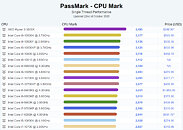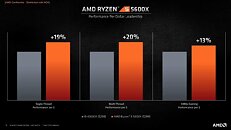Friday, October 23rd 2020

AMD Ryzen 5 5600X Takes the Crown of the Fastest CPU in Passmark Single-Thread Results
AMD has been improving its Zen core design, and with the latest Zen 3 IP found in Ryzen 5000 series CPUs, it seems like the company struck gold. Thanks to the reporting of VideoCardz, we come to know that AMD's upcoming Ryzen 5 5600X CPU has been benchmarked and compared to other competing offerings. In the CPU benchmark called PassMark, which rates all of the CPUs by multi-threaded and single-threaded performance, AMD's Ryzen 5 5600X CPU has taken the crown of the fastest CPU in the single-threaded results chart. Scoring an amazing 3495 points, it is now the fastest CPU for 1T workloads. That puts the CPU above Intel's current best—Core i9-10900K—which scores 3177 points. This puts the Zen 3 core about 10% ahead of the competition.
As a reminder, the AMD Ryzen 5 5600X CPU is a six-core, twelve threaded design that has a base clock of 3.7 GHz and boosts the frequency of the cores to 4.6 GHz, all within the TDP of 65 Watts. The CPU has 32 MB of level-3 (L3) cache and 3 MB of L2 cache.
Source:
VideoCardz
As a reminder, the AMD Ryzen 5 5600X CPU is a six-core, twelve threaded design that has a base clock of 3.7 GHz and boosts the frequency of the cores to 4.6 GHz, all within the TDP of 65 Watts. The CPU has 32 MB of level-3 (L3) cache and 3 MB of L2 cache.



141 Comments on AMD Ryzen 5 5600X Takes the Crown of the Fastest CPU in Passmark Single-Thread Results
It was a rebuttal to the veracity of AMDs performance claims. In relation to Zen 3, that chart I posted about Zen 2 vs Gen 9, is pretty close to their current claims. I seriously doubt you are going to see a 5600X unseat say a 10600K in gaming in the real world. Match it - maybe. Beat it in any significant way, not likely.
Sick of all this crap on TPU.
If this 5600x is as good as it seems, then i will probably switch to it. I have no care for either Intel/Amd or Nvidia/Radeon. I just buy what is best for what i can afford.
this crap goes on all over the internet.
At the end of the day your allegiance should be to your wallet alone and buy what you like.
I know and many know that synthetics do not tell the truth about actual real life performance. But tell me (or show) this... How much faster is the 10600k in gaming (1080p) than a 3600X?
To note, these differences become even more pronounced with new faster GPUs. The 9900K had a 4.8% advantage over the 3900XT in TPUs comparison using the 2080 Ti.
When TPU did the 3900XT vs 9900K vs 10900K comparison with a 3080, that difference went to a full 10%.
It's clear Zen 2 was already limiting gaming performance, but Skylake+++ had more breathing room. It will be interesting to see what happens when they put a Zen 3 up against Gen10 with one of these new GPUs.
And the 5600X with +20% IPC and and another 4.5% speed uplift on top of that wont make it past that 16%?
I know its not 1:1 for IPC+MHz against gaming % perf but still, will see.
And dont we start about the multi threaded perf... or the power draw... let it go.
Basically in the end, it all comes down to the benchmarks in the things you use. Every time someone starts talking nm / IPC / Ghz - that's just meaningless drivel in the end.
B) With Zen 2 vs. Gen 9, AMD was going from a ~8% IPC deficit to a ~7% IPC advantage. This time they're going from a ~7% IPC advantage to a ((107*1.19)-100=) 27.33% IPC advantage. That is certainly a much bigger change than last time around in relation to Intel's current desktop chips. (Ice Lake and Tiger lake have ~18% higher IPC than Skylake, but are only available for mobile.)
And indeed how a SuperPi can determine CPU gaming performance... but nor a Passmark can.
And I didnt choose CB test for IPC determination uplift. AMD claimed that for an avg result over many different workloads. Not just Cinebench... So...
Remember, you're the one that brought up 20% increase in "IPC", I simply said that IPC is meaningless.
So I think the real difference here, with Zen 3, is going to look like the difference between the 4.0Ghz 3100 and the 3300X on the chart in the link below, plus a few % for the clock increases. You'll just get it across the board at all SKUs. That would come out to more like +6-7%. Which would bring them roughly to parity with Comet Lake.
www.techpowerup.com/review/amd-ryzen-3-3300x/16.html
By the way, the example of 3100 vs 3300X is irrelevant. The claimed +19 IPC uplift that AMD has stated is not only from the unified (and larger now) cache but from a lot more architectural improvements
I really dont think that AMD will risk to embarace its self with these kinds of slides and in the end will be on par with the competition while they increase prices. Even the rocks will laugh and they know it. This time I think its serious, and some are doing everything they can to minimize the gravity of it.
Those 2 CPUs have only 100MHz difference. Do they dare to show this and be on par with Intel? How much of a difference would that be between 3600X, 5600X and 10600k? I wonder.
As for gaming performance, they are claiming much, much more than 19% performance improvement: their wording is that the 5900X when compared to the 3900X is "from 5% to 50% improved" with the overall improvements in their testing at 26%. You're presenting it as if they were saying "IPC is better, so games are better", but that is very explicitly not what they are saying; the claims about gaming performance are separate from the IPC claims, and are about specific SKUs compared (in other words including clock speed increases). Again, there will obviously be examples where Intel still wins. But there's little reason to not expect AMD to be on the money when they claim to beat the 10900k overall in gaming.
Some of these scores don't quite add up to the hype. Keep in mind the i9-10900 here is limited on the graphics tests due to the 2070 Super VS 3080s in the two Ryzen boxes.
If these scores are real the performance on the 5600X is somewhat of a mixed bag.
What's funny here is, the one everyone posted is CPU Single Threaded MOps/Sec, ignoring everything else.
The 5950X is suppose to be faster then 5600X in single thread because of clock speed.
The later has a 4.9Ghz Turbo and the other is 4.6Ghz.